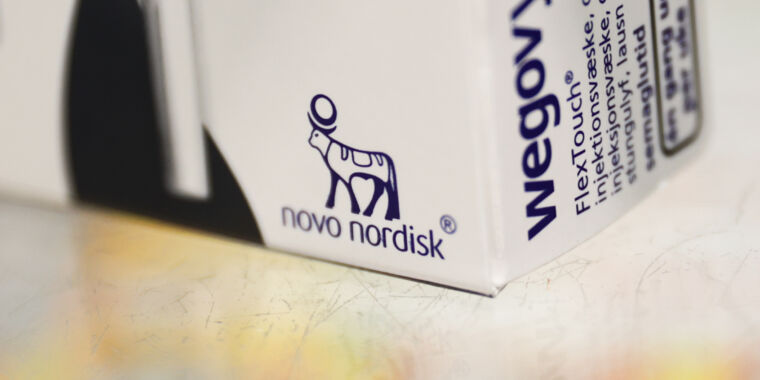With the debut of remarkably effective weight-loss drugs, America’s high obesity rate and its uniquely astronomical prescription drug pricing appear to be set on a catastrophic collision course—one that threatens to “bankrupt our entire health care system,” according to a new Senate report that modeled the economic impact of the drugs in different uptake scenarios.
The HELP committee analysis cited a March Congressional Budget Office (CBO) report that found: “at their current prices, [anti-obesity medicines] would cost the federal government more than it would save from reducing other health care spending—which would lead to an overall increase in the deficit over the next 10 years.” Moreover, in April, the head of the CBO said that the drugmakers would have to slash prices of their weight-loss drugs by 90 percent to “get in the ballpark” of not increasing the national deficit.
The HELP committee report offered a relatively simple solution to the problem: Drugmakers should set their US prices to match the relatively low prices they’ve set in other countries. The report focused on Wegovy because it currently accounts for the most US prescriptions in the new class of weight-loss drugs (GLP-1 drugs). Wegovy is made by Denmark-based Novo Nordisk.
In the US, the estimated net price (after rebates) of Wegovy is $809 per month. In Denmark, the price is $186 per month. A study by researchers at Yale estimated that drugs like Wegovy can be profitably manufactured for less than $5 per month.
If Novo Nordisk set its US prices for Wegovy to match the Danish price, spending to treat half of US adults with obesity would drop from $411 billion to $94.5 billion, a roughly $316.5 billion savings.
Won’t someone think of the profits of the private companies!?! /s
For fucks sake, it’s like it’s the only god damned thing anyone fucking thinks about.
They are. That’s why we’re supplementing the cost of pharmaceuticals rather than legislatively restricting the modified foods causing the obesity in the first place.
Should I not be eating sugared carbs for breakfast, a couple of baconators or a bucket of fried chicken for lunch, and prepackaged salty carbs for dinner?
What about if I throw it all in a casserole dish with some ultra processed mushroom slop, add a bunch of cheese product, and call it homemade? Does that fix it?
its uniquely astronomical prescription drug pricing
lol, what multiverse version of the US has this writer been living in? There is nothing remotely unique about the astronomical price. It’s just that these drugs treat such an extremely common problem that the astronomical price has raised more awareness than it typically does for other drugs. Just look up “orphan drugs” and I’m sure it won’t be long before prices in the tens to hundreds of thousands of dollars get mentioned.
The antecedent of “its” is America, not the drug
Can no one else manufacture semaglutide?
Sure they can, but I’m pretty sure the companies who created them have like a decade before other companies are allowed to even think about creating generic versions of the same drug. Our patent and copyright systems are both completely fucking broken.
The ten years of exclusive control is such a shitty idea. I was on a medication that actually had that period extended beyond 10 years, and I struggled to get the medication I needed pretty much from the day it hit the market until a generic was finally made available. And even that was only after the company resisted hard enough to get a class action suit filed against them.
It would be so simple to change the patent laws so that getting the patent requires them to allow other manufacturers to produce the drug as well, and instead of exclusivity, they can get a 10% cut. Still plenty of incentive to patent a new drug, but now that incentive is only raising prices by 10% instead of 10,000%.
Read the article. This is not a US product.
I agree with you though.
True, but its about their operations in the US, which are required to follow US laws. They still need a patent and copyright from the US government for their US operations.
This means their patent for the drug in the US system means they can prevent it from being available to US consumers as a generic.
Also, the issue of the cost is related to how our government isn’t allowed to negotiate drug costs like others are.
The drug is made by a foreign company that has a presence in the US. They have a US headquarters for their US business.
Local laws have more to do with the issues raised in the article than the origin country of the company making the drug.
That’s like saying T-Mobile is bound by German laws despite operating in the US because it is owned by Deutsche Telecom.
it’s a short synthetic peptide with unnatural aminoacids, sure in principle you could make it in completely automated way on SPPS but this is so expensive it’s really for research only. on scale you’d need normal wet synthesis, bucket scale or bigger and this is where things get tricky, especially purificationS and many of them, each intermediate needs one; then analysis and qc of it all. on top of that account for sourcing or synthesis of all these weird bits that you need, including multiple vendors and second options so that nothing gets halted because you’re out of some basic reagent or solvent
this shit is hard but also it’s opposite of career killer. i’m specifically not complaining
In the US, the estimated net price (after rebates) of Wegovy is $809 per month. In Denmark, the price is $186 per month. A study by researchers at Yale estimated that drugs like Wegovy can be profitably manufactured for less than $5 per month.
Meanwhile an MBA somewhere is like, “And leave 800 bucks on the table? NEVER.”
I’ll tell you something else that will bankrupt the healthcare system: obesity.
Here’s an easy solution: send the bill to those who caused the obesity epidemic and the need for expensive weight loss drugs in the first place: the agro industry. Slap a moderate tax on any heavily processed food (that is, the vast majority of the food sold in the US) and you’ll fund the weight loss drug free for everyone ten times over.
Hmmm, your idea doesn’t fuck over poor people to help rich people make more money. It’ll never work.
FFS It’s a Diabetes drug, give it to the people who actually need it, not people who just want it to lose weight easy. I know multiple diabetics and according to them, this one is seriously gamechanging for maintaining blood sugar.
It pisses me off to hear about shortages caused by people being prescribed it to shed a few pounds.
There is no shortage. It’s available to anyone who wants to pay for it.
Bankrupting the insurance industry sounds like a good start to me. I saw a similar article in which fast food executives were fretting about reduced sales due to ozempic. I wonder what other industries are vulnerable to reduced sales volume due to fewer fat Americans? Probably knee doctors.
Worry not too much. Over at r/Ozempic, It’s mostly just a bunch of fat people posting still-fat pictures of themselves.
For example:
“I used to be 310lbs, and now I’m 280!”








